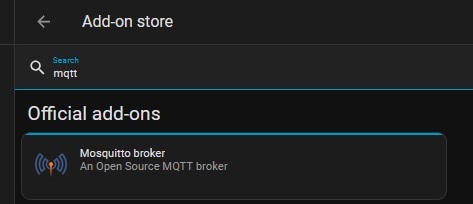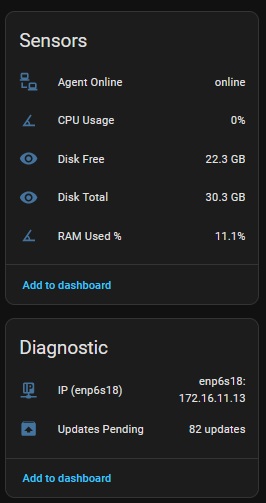If you’re managing Linux or Ubuntu servers at home or in a lab, a simple, reliable way to view system health inside Home Assistant is a game changer. This post introduces my lightweight MQTT Agent for Ubuntu that integrates your servers via the Mosquitto broker and includes the full install script for viewing and download.
What the MQTT Agent Does
The agent installs as a background service on your Ubuntu (Debian-based) machine and publishes system metrics to your Home Assistant MQTT broker. Home Assistant then auto-discovers the server as a device with sensors you can place on dashboards or use in automations.

Discovered Sensors
Once installed, these sensors are created for each server:
- Agent Online — Confirms the agent is running and connected
- CPU Usage — Current CPU utilisation (%)
- Disk Free — Free space on the root drive
- Disk Total — Total size of the root drive
- RAM Used % — Memory utilisation (%)
- Server IP — Active IP address
- Pending Updates — Number of available OS updates (checked hourly)
The agent is lightweight and publishes over MQTT (port 1883 by default, or 8883 if you enable SSL on your broker).
Set Up MQTT in Home Assistant (Mosquitto)
- Install Mosquitto broker add-on
Go to: Settings > Add-ons > Add-on store
Search for “Mosquitto broker” and click Install. - Create an MQTT user
Go to: Settings > People > Users > Add User
Example:
Display name: MQTT
Username: MQTT
Password: Use something secure
After creating the user, restart the Mosquitto add-on. - (Optional) Enable SSL
In the Mosquitto Configuration tab, upload your certificates if you want encrypted MQTT on port 8883.
That’s it — Home Assistant is now ready to receive metrics from your Ubuntu servers.
Download the MQTT Agent Script
Here’s the exact installer script I use. You can download it directly or copy it as-is.
Download: install-ha-mqtt-agent.sh
#!/usr/bin/env bash
# install-ha-mqtt-agent.sh
# Usage:
# sudo bash install-ha-mqtt-agent.sh -install # install/upgrade
# sudo bash install-ha-mqtt-agent.sh -uninstall # remove everything
set -euo pipefail
ACTION="${1:- -install}"
# ---- Config (edit if needed) ----
MQTT_HOST="homeassistant.changeme.co.uk"
MQTT_PORT="1883"
MQTT_USER="changeme"
MQTT_PASS="changeme"
# Heartbeat & expiry (seconds)
HEARTBEAT_INTERVAL=30 # metrics timer
SENSOR_EXPIRE=120 # sensors stale timeout (cpu/ram/disk/updates/ip)
LOG_DIR="/var/log/mqtt-agent"
LOG_FILE="$LOG_DIR/agent.log"
MAX_LOG_BYTES=$((1024*1024)) # 1 MiB
DEVICE_ID="$(hostname -s || hostname)"
# Capitalize the device name's first letter for nicer sensor labels
DEVICE_NAME="$(printf '%s' "$DEVICE_ID" | sed 's/^./\u&/')"
ensure_logs() {
mkdir -p "$LOG_DIR"
touch "$LOG_FILE"
# truncate if too big
if [ -f "$LOG_FILE" ]; then
size=$(stat -c%s "$LOG_FILE" 2>/dev/null || wc -c <"$LOG_FILE")
if [ "${size:-0}" -gt "$MAX_LOG_BYTES" ]; then
: > "$LOG_FILE"
fi
fi
}
write_common_lib() {
install -d -m 0755 /usr/local/lib/ha-mqtt-agent
cat > /usr/local/lib/ha-mqtt-agent/common.sh <<'EOF'
#!/usr/bin/env bash
set -euo pipefail
LOG_DIR="/var/log/mqtt-agent"
LOG_FILE="$LOG_DIR/agent.log"
MAX_LOG_BYTES=${LOG_MAX_BYTES:-1048576}
mkdir -p "$LOG_DIR"
touch "$LOG_FILE"
# truncate if too big
if [ -f "$LOG_FILE" ]; then
size=$(stat -c%s "$LOG_FILE" 2>/dev/null || wc -c <"$LOG_FILE")
if [ "${size:-0}" -gt "$MAX_LOG_BYTES" ]; then
: > "$LOG_FILE"
fi
fi
# Redirect all stdout/stderr to the log
exec >>"$LOG_FILE" 2>&1
log() {
# usage: log "message"
echo "$(date -Is) [$0] $*"
}
EOF
chmod +x /usr/local/lib/ha-mqtt-agent/common.sh
}
install_all() {
export DEBIAN_FRONTEND=noninteractive
apt-get update
apt-get install -y --no-install-recommends jq mosquitto-clients apt-show-versions coreutils gawk logrotate iproute2 util-linux
ensure_logs
install -d -m 0755 /usr/local/bin
install -d -m 0755 /usr/local/lib/ha-mqtt-agent
install -d -m 0755 /etc/ha-mqtt-agent
install -d -m 0755 /run/ha-mqtt-agent
# env file
cat > /etc/ha-mqtt-agent/env <<EOF
MQTT_HOST="$MQTT_HOST"
MQTT_PORT="$MQTT_PORT"
MQTT_USER="$MQTT_USER"
MQTT_PASS="$MQTT_PASS"
HEARTBEAT_INTERVAL="$HEARTBEAT_INTERVAL"
SENSOR_EXPIRE="$SENSOR_EXPIRE"
# device id/name default to host at runtime
EOF
# common lib (logging)
write_common_lib
# metrics (publishes heartbeat + metrics + cached updates + per-iface IPs every run)
cat > /usr/local/bin/ha-mqtt-metrics.sh <<'EOF'
#!/usr/bin/env bash
set -euo pipefail
source /usr/local/lib/ha-mqtt-agent/common.sh
log "starting metrics script"
source /etc/ha-mqtt-agent/env
HOSTNAME_SHORT="$(hostname -s || hostname)"
DEVICE_ID="$HOSTNAME_SHORT"
DEVICE_NAME="$(printf '%s' "$HOSTNAME_SHORT" | sed 's/^./\u&/')"
BASE="servers/$DEVICE_ID"
HEARTBEAT_TOPIC="$BASE/heartbeat"
STATE_TOPIC="$BASE/state"
UPDATES_TOPIC="$BASE/updates"
RUNDIR="/run/ha-mqtt-agent"; mkdir -p "$RUNDIR"
CACHE="$RUNDIR/updates.cache"
# CPU usage over ~0.5s
read -r cpu user nice system idle iowait irq softirq steal guest guest_nice < /proc/stat
total1=$((user+nice+system+idle+iowait+irq+softirq+steal))
idle1=$idle
sleep 0.5
read -r cpu user nice system idle iowait irq softirq steal guest guest_nice < /proc/stat
total2=$((user+nice+system+idle+iowait+irq+softirq+steal))
idle2=$idle
totald=$((total2-total1))
idled=$((idle2-idle1))
cpu_used=$(( (1000*(totald-idled)/totald + 5)/10 ))
# RAM used %
mem_used_pct="$(free | awk '/Mem:/{printf("%.1f", $3*100/$2)}')"
# Disk for /
read -r total used free <<<"$(df -B1 / | awk 'NR==2{print $2, $3, $4}')"
disk_free_gb=$(awk -v f="$free" 'BEGIN {printf "%.1f", f/1024/1024/1024}')
disk_total_gb=$(awk -v t="$total" 'BEGIN {printf "%.1f", t/1024/1024/1024}')
payload="$(jq -n --arg host "$DEVICE_NAME" \
--argjson cpu "$cpu_used" \
--argjson ram "$mem_used_pct" \
--argjson disk_free_gb "$disk_free_gb" \
--argjson disk_total_gb "$disk_total_gb" \
'{host:$host, cpu:$cpu, ram:$ram, disk_free_gb:$disk_free_gb, disk_total_gb:$disk_total_gb}')"
mosquitto_pub -h "$MQTT_HOST" -p "$MQTT_PORT" -u "$MQTT_USER" -P "$MQTT_PASS" -t "$STATE_TOPIC" -m "$payload" || log "ERROR publishing metrics"
# Per-interface IPv4s (first address per interface), only 'up' and global
# Publish to servers/<host>/ip/<iface>
while IFS= read -r line; do
iface_raw="$(echo "$line" | awk '{print $2}')"
iface="${iface_raw%%@*}" # strip @ifindex
ipaddr="$(echo "$line" | awk '{print $4}' | cut -d'/' -f1)"
# sanitize iface name for topic (and trim trailing _)
safe_iface="$(echo "$iface" | tr -c 'A-Za-z0-9_' '_' | sed 's/_\+$//')"
[ -n "$ipaddr" ] && mosquitto_pub -h "$MQTT_HOST" -p "$MQTT_PORT" -u "$MQTT_USER" -P "$MQTT_PASS" \
-t "$BASE/ip/$safe_iface" -m "$iface: $ipaddr" || true
done < <(ip -o -4 addr show scope global up | awk '!seen[$2]++')
# Re-publish cached updates (so sensor expires with heartbeat if agent dies)
if [ -f "$CACHE" ]; then
cached="$(tr -d '[:space:]' < "$CACHE")"
if [[ "$cached" =~ ^[0-9]+$ ]]; then
mosquitto_pub -h "$MQTT_HOST" -p "$MQTT_PORT" -u "$MQTT_USER" -P "$MQTT_PASS" -t "$UPDATES_TOPIC" -m "$cached" || log "ERROR publishing cached updates"
log "published cached updates: $cached"
fi
fi
# Heartbeat (non-retained)
mosquitto_pub -h "$MQTT_HOST" -p "$MQTT_PORT" -u "$MQTT_USER" -P "$MQTT_PASS" -t "$HEARTBEAT_TOPIC" -m "online" || true
EOF
chmod +x /usr/local/bin/ha-mqtt-metrics.sh
# updates (hourly real count; single-instance lock; waits for apt locks; writes cache; non-retained publish)
cat > /usr/local/bin/ha-mqtt-updates.sh <<'EOF'
#!/usr/bin/env bash
set -euo pipefail
source /usr/local/lib/ha-mqtt-agent/common.sh
log "starting updates script"
source /etc/ha-mqtt-agent/env
HOSTNAME_SHORT="$(hostname -s || hostname)"
DEVICE_ID="$HOSTNAME_SHORT"
BASE="servers/$DEVICE_ID"
UPDATES_TOPIC="$BASE/updates"
RUNDIR="/run/ha-mqtt-agent"; mkdir -p "$RUNDIR"
CACHE="$RUNDIR/updates.cache"
LOCK="$RUNDIR/updates.lock"
# ensure only one updates run at a time
exec 200>"$LOCK"
if ! flock -n 200; then
log "another updates run is active, exiting"
exit 0
fi
wait_for_apt_locks() {
local tries=0
local max_tries=40 # ~10 minutes at 15s
local sleep_s=15
while [ $tries -lt $max_tries ]; do
local blocked=0
for f in /var/lib/apt/lists/lock /var/lib/dpkg/lock-frontend /var/lib/dpkg/lock; do
if fuser "$f" >/dev/null 2>&1; then
blocked=1
log "apt lock on $f; waiting ${sleep_s}s (try $((tries+1))/$max_tries)"
fi
done
[ $blocked -eq 0 ] && return 0
tries=$((tries+1))
sleep "$sleep_s"
done
log "apt appears locked for too long; proceeding anyway"
return 0
}
export DEBIAN_FRONTEND=noninteractive
log "waiting for apt locks (if any)..."
wait_for_apt_locks
log "running apt-get update..."
if apt-get update -qq -o Acquire::Retries=3; then
log "apt-get update complete"
else
log "apt-get update failed (continuing to count upgrades)"
fi
count="$(apt-show-versions -u -b | sed '/^No .* upgrades/d' | wc -l | tr -d '[:space:]' || echo 0)"
[ -z "${count:-}" ] && count=0
echo "$count" > "$CACHE"
log "updates pending: $count (cached at $CACHE)"
mosquitto_pub -h "$MQTT_HOST" -p "$MQTT_PORT" -u "$MQTT_USER" -P "$MQTT_PASS" -t "$UPDATES_TOPIC" -m "$count" || log "ERROR publishing updates"
EOF
chmod +x /usr/local/bin/ha-mqtt-updates.sh
# discovery (uses heartbeat for availability + expire_after for ALL sensors including updates and IPs)
cat > /usr/local/bin/ha-mqtt-discovery.sh <<'EOF'
#!/usr/bin/env bash
set -euo pipefail
source /usr/local/lib/ha-mqtt-agent/common.sh
log "starting discovery script"
source /etc/ha-mqtt-agent/env
HOSTNAME_SHORT="$(hostname -s || hostname)"
DEVICE_ID="$HOSTNAME_SHORT"
DEVICE_NAME="$(printf '%s' "$HOSTNAME_SHORT" | sed 's/^./\u&/')"
HEARTBEAT_TOPIC="servers/$DEVICE_ID/heartbeat"
STATE_TOPIC="servers/$DEVICE_ID/state"
device_json="$(jq -n --arg id "$DEVICE_ID" --arg name "$DEVICE_NAME" '{identifiers:[$id],manufacturer:"DIY",model:"Linux Server",name:$name}')"
pub_cfg_sensor() {
local object="$1"; shift
local body="$1"; shift
local topic="homeassistant/sensor/$DEVICE_ID/$object/config"
local tries=0
until mosquitto_pub -h "$MQTT_HOST" -p "$MQTT_PORT" -u "$MQTT_USER" -P "$MQTT_PASS" -t "$topic" -r -m "$body"; do
tries=$((tries+1))
log "WARN: publish $object discovery failed (attempt $tries)"
if [ $tries -ge 5 ]; then
log "ERROR: giving up on $object discovery after $tries attempts"
return 0
fi
sleep 2
done
log "published discovery for $object"
}
# Agent Online (sensor with expire_after so it becomes Unavailable)
agent_online_cfg="$(jq -n \
--arg name "Agent Online" \
--arg obj "agent_online" \
--arg def_ent "sensor.${DEVICE_ID}_agent_online" \
--arg uid "${DEVICE_ID}_agent_online" \
--arg stat "$HEARTBEAT_TOPIC" \
--argjson dev "$device_json" \
--argjson exp ${SENSOR_EXPIRE:-120} \
'{name:$name, obj_id:$obj, def_ent_id:$def_ent, uniq_id:$uid, stat_t:$stat, avty_t:$stat, pl_avail:"online", pl_not_avail:"offline", exp_aft:$exp, icon:"mdi:lan-connect", dev:$dev}')"
cpu_cfg="$(jq -n \
--arg name "CPU Usage" \
--arg obj "cpu" \
--arg def_ent "sensor.${DEVICE_ID}_cpu" \
--arg uid "${DEVICE_ID}_cpu" \
--arg stat "$STATE_TOPIC" \
--arg avail "$HEARTBEAT_TOPIC" \
--argjson dev "$device_json" \
--argjson exp ${SENSOR_EXPIRE:-120} \
'{name:$name, obj_id:$obj, def_ent_id:$def_ent, uniq_id:$uid, stat_t:$stat, val_tpl:"{{ value_json.cpu }}", unit_of_meas:"%", dev_cla:"power_factor", avty_t:$avail, pl_avail:"online", pl_not_avail:"offline", exp_aft:$exp, dev:$dev}')"
ram_cfg="$(jq -n \
--arg name "RAM Used %" \
--arg obj "ram" \
--arg def_ent "sensor.${DEVICE_ID}_ram" \
--arg uid "${DEVICE_ID}_ram" \
--arg stat "$STATE_TOPIC" \
--arg avail "$HEARTBEAT_TOPIC" \
--argjson dev "$device_json" \
--argjson exp ${SENSOR_EXPIRE:-120} \
'{name:$name, obj_id:$obj, def_ent_id:$def_ent, uniq_id:$uid, stat_t:$stat, val_tpl:"{{ value_json.ram }}", unit_of_meas:"%", dev_cla:"power_factor", avty_t:$avail, pl_avail:"online", pl_not_avail:"offline", exp_aft:$exp, dev:$dev}')"
disk_free_cfg="$(jq -n \
--arg name "Disk Free" \
--arg obj "disk_free" \
--arg def_ent "sensor.${DEVICE_ID}_disk_free" \
--arg uid "${DEVICE_ID}_disk_free" \
--arg stat "$STATE_TOPIC" \
--arg avail "$HEARTBEAT_TOPIC" \
--argjson dev "$device_json" \
--argjson exp ${SENSOR_EXPIRE:-120} \
'{name:$name, obj_id:$obj, def_ent_id:$def_ent, uniq_id:$uid, stat_t:$stat, val_tpl:"{{ value_json.disk_free_gb }}", unit_of_meas:"GB", stat_cla:"measurement", avty_t:$avail, pl_avail:"online", pl_not_avail:"offline", exp_aft:$exp, dev:$dev}')"
disk_total_cfg="$(jq -n \
--arg name "Disk Total" \
--arg obj "disk_total" \
--arg def_ent "sensor.${DEVICE_ID}_disk_total" \
--arg uid "${DEVICE_ID}_disk_total" \
--arg stat "$STATE_TOPIC" \
--arg avail "$HEARTBEAT_TOPIC" \
--argjson dev "$device_json" \
--argjson exp ${SENSOR_EXPIRE:-120} \
'{name:$name, obj_id:$obj, def_ent_id:$def_ent, uniq_id:$uid, stat_t:$stat, val_tpl:"{{ value_json.disk_total_gb }}", unit_of_meas:"GB", avty_t:$avail, pl_avail:"online", pl_not_avail:"offline", exp_aft:$exp, dev:$dev}')"
updates_cfg="$(jq -n \
--arg name "Updates Pending" \
--arg obj "updates" \
--arg def_ent "sensor.${DEVICE_ID}_updates" \
--arg uid "${DEVICE_ID}_updates" \
--arg stat "servers/$DEVICE_ID/updates" \
--arg avail "$HEARTBEAT_TOPIC" \
--argjson dev "$device_json" \
--argjson exp ${SENSOR_EXPIRE:-120} \
'{name:$name, obj_id:$obj, def_ent_id:$def_ent, uniq_id:$uid, stat_t:$stat, unit_of_meas:"updates", icon:"mdi:package-up", avty_t:$avail, pl_avail:"online", pl_not_avail:"offline", exp_aft:$exp, dev:$dev, entity_category:"diagnostic"}')"
pub_cfg_sensor "agent_online" "$agent_online_cfg"
pub_cfg_sensor "cpu" "$cpu_cfg"
pub_cfg_sensor "ram" "$ram_cfg"
pub_cfg_sensor "disk_free" "$disk_free_cfg"
pub_cfg_sensor "disk_total" "$disk_total_cfg"
pub_cfg_sensor "updates" "$updates_cfg"
# Per-interface IP sensors (discovered dynamically)
# We'll publish sensor for each active global IPv4 interface, name: "IP (<iface>)"
while IFS= read -r line; do
iface_raw="$(echo "$line" | awk '{print $2}')"
iface="${iface_raw%%@*}" # strip @ifindex
ipaddr="$(echo "$line" | awk '{print $4}' | cut -d'/' -f1)"
[ -z "$ipaddr" ] && continue
safe_iface="$(echo "$iface" | tr -c 'A-Za-z0-9_' '_' | sed 's/_\+$//')"
name="IP ($iface)"
uid="${DEVICE_ID}_ip_${safe_iface}"
stat="servers/$DEVICE_ID/ip/$safe_iface"
obj="ip_${safe_iface}"
def_ent="sensor.${DEVICE_ID}_${obj}"
ip_cfg="$(jq -n \
--arg name "$name" \
--arg obj "$obj" \
--arg def_ent "$def_ent" \
--arg uid "$uid" \
--arg stat "$stat" \
--arg avail "$HEARTBEAT_TOPIC" \
--argjson dev "$device_json" \
--argjson exp ${SENSOR_EXPIRE:-120} \
'{name:$name, obj_id:$obj, def_ent_id:$def_ent, uniq_id:$uid, stat_t:$stat, avty_t:$avail, pl_avail:"online", pl_not_avail:"offline", exp_aft:$exp, icon:"mdi:ip-network", dev:$dev, entity_category:"diagnostic"}')"
pub_cfg_sensor "ip_${safe_iface}" "$ip_cfg"
done < <(ip -o -4 addr show scope global up | awk '!seen[$2]++')
EOF
chmod +x /usr/local/bin/ha-mqtt-discovery.sh
# systemd units (ensure /run/ha-mqtt-agent exists automatically; and preserve it after stop)
cat > /etc/systemd/system/ha-mqtt-metrics.service <<'EOF'
[Unit]
Description=Publish Linux metrics to MQTT (HA)
Wants=network-online.target
After=network-online.target
[Service]
Type=oneshot
ExecStart=/usr/local/bin/ha-mqtt-metrics.sh
EnvironmentFile=/etc/ha-mqtt-agent/env
RuntimeDirectory=ha-mqtt-agent
RuntimeDirectoryMode=0755
RuntimeDirectoryPreserve=yes
EOF
cat > /etc/systemd/system/ha-mqtt-metrics.timer <<EOF
[Unit]
Description=Run HA MQTT metrics every ${HEARTBEAT_INTERVAL}s
[Timer]
OnBootSec=20s
OnUnitActiveSec=${HEARTBEAT_INTERVAL}s
Unit=ha-mqtt-metrics.service
[Install]
WantedBy=timers.target
EOF
cat > /etc/systemd/system/ha-mqtt-updates.service <<'EOF'
[Unit]
Description=Publish updates count to MQTT (HA)
Wants=network-online.target
After=network-online.target
[Service]
Type=oneshot
ExecStart=/usr/local/bin/ha-mqtt-updates.sh
EnvironmentFile=/etc/ha-mqtt-agent/env
RuntimeDirectory=ha-mqtt-agent
RuntimeDirectoryMode=0755
RuntimeDirectoryPreserve=yes
EOF
cat > /etc/systemd/system/ha-mqtt-updates.timer <<'EOF'
[Unit]
Description=Run updates publisher hourly
[Timer]
OnBootSec=2m
OnUnitActiveSec=1h
Unit=ha-mqtt-updates.service
[Install]
WantedBy=timers.target
EOF
cat > /etc/systemd/system/ha-mqtt-discovery.service <<'EOF'
[Unit]
Description=Publish Home Assistant MQTT Discovery configs
Wants=network-online.target
After=network-online.target
[Service]
Type=oneshot
ExecStart=/usr/local/bin/ha-mqtt-discovery.sh
EnvironmentFile=/etc/ha-mqtt-agent/env
[Install]
WantedBy=multi-user.target
EOF
# logrotate
cat > /etc/logrotate.d/mqtt-agent <<'EOF'
/var/log/mqtt-agent/agent.log {
size 1M
rotate 3
missingok
notifempty
compress
delaycompress
copytruncate
create 0640 root adm
}
EOF
systemctl daemon-reload
systemctl enable --now ha-mqtt-discovery.service
systemctl enable --now ha-mqtt-metrics.timer
systemctl enable --now ha-mqtt-updates.timer
# Seed sensors immediately
/usr/local/bin/ha-mqtt-metrics.sh || true
/usr/local/bin/ha-mqtt-updates.sh || true
echo "Installation complete.
Device: $DEVICE_NAME
Broker: $MQTT_HOST:$MQTT_PORT
Metrics every ${HEARTBEAT_INTERVAL}s; sensors expire after ${SENSOR_EXPIRE}s if no data.
RuntimeDirectory preserved across job exits to avoid /run deletions mid-run.
Updates handle apt locks and prevent overlapping runs.
Logs: $LOG_FILE (rotated at ~1MiB)"
}
uninstall_all() {
set +e
systemctl disable --now ha-mqtt-metrics.timer ha-mqtt-updates.timer ha-mqtt-discovery.service 2>/dev/null
systemctl stop ha-mqtt-metrics.service ha-mqtt-updates.service 2>/dev/null
systemctl daemon-reload
rm -f /etc/systemd/system/ha-mqtt-metrics.service
rm -f /etc/systemd/system/ha-mqtt-metrics.timer
rm -f /etc/systemd/system/ha-mqtt-updates.service
rm -f /etc/systemd/system/ha-mqtt-updates.timer
rm -f /etc/systemd/system/ha-mqtt-discovery.service
rm -f /usr/local/bin/ha-mqtt-metrics.sh
rm -f /usr/local/bin/ha-mqtt-updates.sh
rm -f /usr/local/bin/ha-mqtt-discovery.sh
rm -rf /usr/local/lib/ha-mqtt-agent
rm -rf /etc/ha-mqtt-agent
rm -f /etc/logrotate.d/mqtt-agent
rm -rf /var/log/mqtt-agent
rm -rf /run/ha-mqtt-agent
systemctl daemon-reload
echo "Uninstall complete."
}
case "$ACTION" in
-install|--install|install)
install_all
;;
-uninstall|--uninstall|uninstall)
uninstall_all
;;
*)
echo "Usage: $0 [-install|--install|install] | [-uninstall|--uninstall|uninstall]"
exit 2
;;
esac
Installing the MQTT Agent on Ubuntu
- Copy install-ha-mqtt-agent.sh to your server.
- Run the installer:
sudo bash install-ha-mqtt-agent.sh -installWhen the installer completes, your server should appear in:
Home Assistant → Settings → Devices & Services → MQTT
If it doesn’t, confirm that port 1883 (or 8883 for SSL) is open between your server and Home Assistant.
For troubleshooting, check:
sudo systemctl status mqtt-agent
sudo tail -f /var/log/mqtt-agent/mqtt-agent.logTo remove the agent:
sudo bash install-ha-mqtt-agent.sh -uninstallExample Data

Future Plans
- Additional metrics: uptime, network throughput, temperatures
- Interactive installer prompts for SSL/TLS
Final Thoughts
The Ubuntu MQTT Agent is a quick win for anyone who wants real-time server telemetry inside Home Assistant. It’s minimal, secure, and easy to automate against — perfect for homelabs and small server fleets.
Tags: Home Assistant, MQTT, Ubuntu, Linux, Monitoring, Mosquitto, Automation
